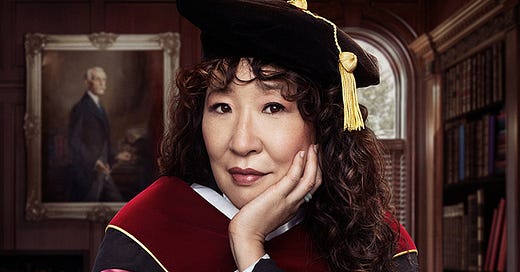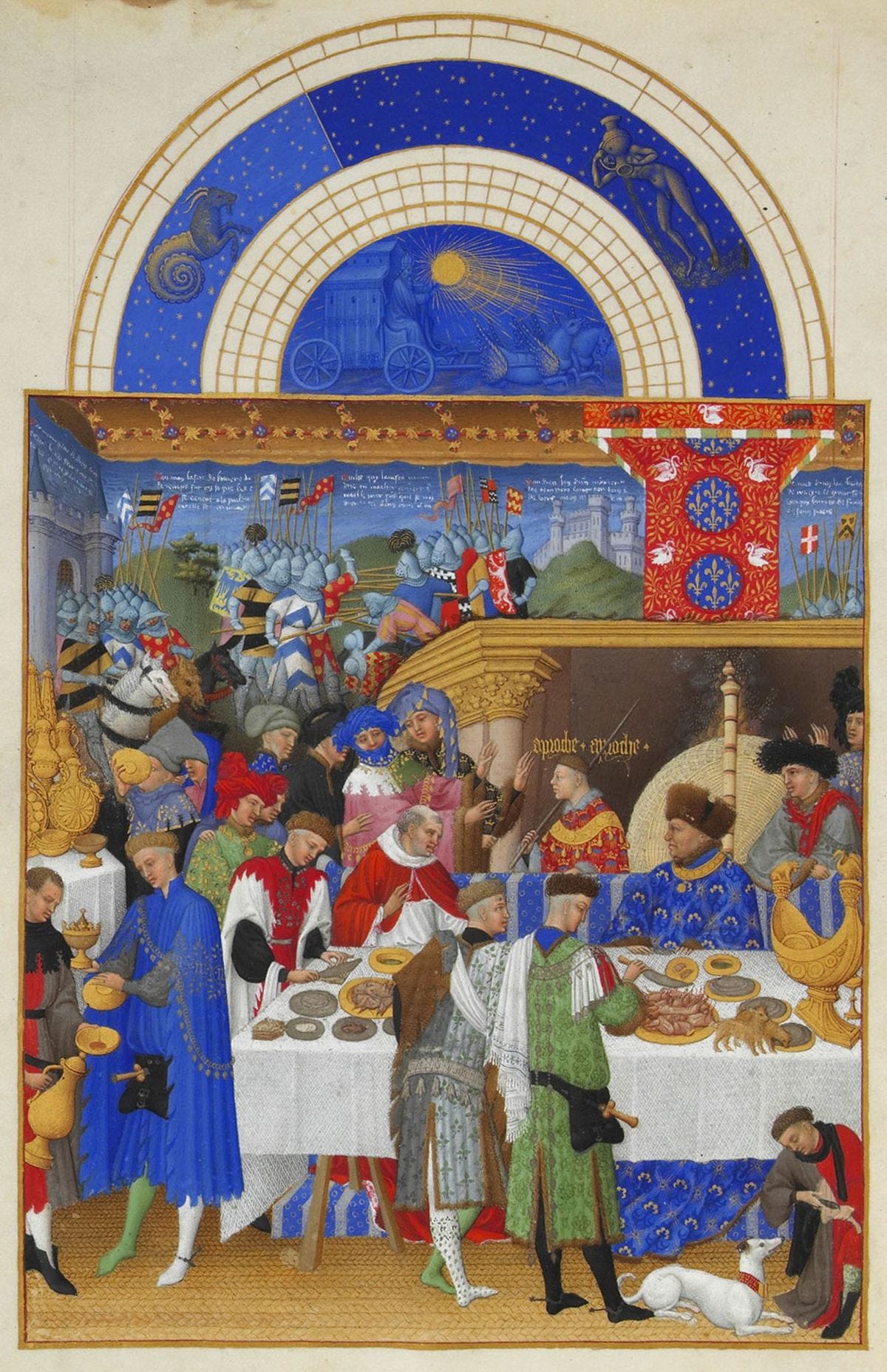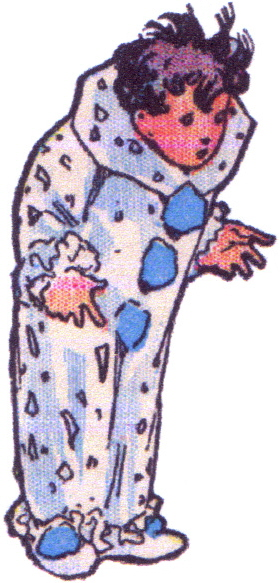First of all, you can stop asking: I have not yet watched nor at this moment do I feel particularly inclined to watch The Chair, in spite of my affection for the likes of Sandra Oh and Bob Balaban; when people started talking it up on Twitter, I found myself counter-programming old episodes of Community instead. To me at least, the premise of the show reads as a Trojan horse for right-wing culture war talking points, transferring the blame for the parlous state of American higher education from neoliberal administrators and anti-intellectual legislators to an imaginary mob of woke students eager to cancel the classics and the profs that teach them. As I told my cousin, who used to work in the White House, I imagine watching the show would give me the same heebie-jeebies she probably gets when she happens to take in an episode of The West Wing. Though I suspect that show is a lot more flattering in its portrayal of White House staffers than The Chair is of befuddled academics. For now, if I want to see a professor acting like an ass on screen, I’ll stick with Ken Jeong’s sublimely unhinged Professor “Señor” Ben Chang, thank you very much.
My students may or may not be woke, but whatever might be wrong with the American university—or my own small liberal arts college—didn’t start with them. They emerge from the culture that has produced them, pure products of America (and quite a few other countries), justifiably anxious about the future in general and their own futures in particular. They are overwhelmingly concerned (as are their parents, who write the checks) with professional outcomes, with bang for their buck, with choosing a bulletproof major. How could they be any other way when our system for paying for college is so badly out of whack—when we as a nation have decided that it somehow makes sense to mortgage the future at our young people’s expense?
And so I, like many of my colleagues, find myself speaking to them (and to our administrators) with a forked tongue. On the one hand, I strive to reassure current and prospective students that a liberal arts education such as the one we offer is the very best preparation for virtually any profession worthy of the name. Our students learn to read and interpret complex texts; they know how to do research; they learn to present their ideas clearly and forcefully verbally and in writing; ideally, they acquire a degree of intellectual maturity and a tolerance for ambiguity sorely lacking in the larger culture. A liberal arts degree is an excellent investment—just ask the Harvard Business Review.
On the other hand, every year I feel a little bit more like a monk bent over his illuminated manuscripts in some godforsaken corner of Europe circa 500 AD. I get the image from Janet Burroway, of all people, and her massively influential book Writing Fiction, which I’ll be teaching with this semester. Creative writing textbooks tend to be guilty of the same bland uplift one encounters in self-help books, but here and there Burroway strikes a note worthy of Theodor Adorno at his most pessimistic. Consider this passage from Burroway’s preface to the 2019 edition, which follows a paragraph in which Burroway tracks the decline of literature’s cultural prestige in the second half of the twentieth century:
In the face of this, it amazed me, as a young teacher, to find that my (by and large poorly read) students were passionate about writing fiction. What was it that motivated them? Was it a superficial and selfish fantasy? Or did they somehow perceive that their passive absorption of the sitcom and the soap had left them wanting? Was this a lazy alternative to academia, or were we in fact the monks of the new dark ages, keeping the culture alive? (xv)
Earlier in the preface, Burroway points out that our society has reached a strange new inflection point in our relationship to literacy. Thanks to the Internet, we now write more than we read: our primary interface with the world is through text, even if that text is littered with emojis or takes the form of captions to Instagram shots. Books are published in the tens of thousands each year, and a few titles become hyper-visible consumer products, but most go all but unread; in a sense, they are as cut off from potential readers as the Très Riches Heures of the Duc de Barry were from the Duc’s illiterate peasants. Instead of reading, we write: text messages, Facebook posts, endless work emails, tweets. TL;DR is the order of the day (nice use of the semicolon, though); we absorb text in bullet-pointed bursts more than we read it. No wonder if those of us scuttling more or less unnoticed from endangered indie bookstore to coffee shop with a NYRB re-issue in our hands feel like survivors of a disaster hardly anyone else has noticed. Imagining surviving the sinking of the Titanic without being granted so much as an interview with a tabloid afterwards. If a book drops in the forest of media, will anybody read it?
What is the teaching of creative writing for? In Burroway’s account, our goals are humiliatingly modest:
People read a great deal, but they do not read skillfully written and edited text as a part of daily life. Of literary readers there may be a precious few, but the computer and the internet have made writers of all the generations present and to come. To write emails, messages, posts, tweets, and blogs is all to the good. To write a grammatically accurate post, an alliterative tweet, a metaphorical blog entry, will salvage just a little of our culture. To recognize the tools of grammar, alliteration, and metaphor will salvage a little more. (xvi)
When I’m in sales-pitch mode, trying to lure a talented finance major to the dark side, this is more or less what I’m thinking: it’s the appeal to skills that will keep the humanities afloat, but underneath that appeal lurks the perhaps forlorn hope that some habit of civilization might yet emerge from the barbaric yawping stew of text in which we are immersed. When I’m wearing my monk’s robes (or my doctoral regalia) and I’m not thinking about putting bodies in seats, I see my mission as something more pure, almost as though I were one of the living “books” from Farenheit 451: my love, my memory, of the experience of reading Melville and Baldwin and Dickinson and Proust makes me a resource that may in some way serve, though I only stand and wait. Or as Burroway puts it, “A university has two distinct purposes. One is to get its students ready for life in the ‘real’ world. The other is to keep, in a cool dry place, the knowledge and wisdom that the real world isn’t buying at the moment” (xvi).
Minima Moralia it ain’t, but Burroway’s preface is certainly a reflection from damaged life: an acknowledgment of the weakness of demand for the pleasures and difficulties of the thing called “literature.” Are those of us who teach creative writing “carrying the fire,” like the nameless father stumbling through the post-apocalyptic landscape of Cormac McCarthy’s The Road? Or are we hucksters, albeit of an enlightened sort, trying to trick our students into absorbing a little truth and beauty on their way out the door?
I’m braced for the cliches that are sure to greet me when I finally do fire up The Chair: if they don’t play Handel’s “The Arrival of the Queen of Sheba” in the very first episode, while panning across ivy-covered buildings, I’ll eat my tam. I very much doubt I’ll catch so much as a glimpse of what I most value in my academic life—the thing that Agnes Callard, in a typically perspicacious (and slyly pugnacious) recent article calls heterodidacticism—the intellectual life that arises when people pursue the pleasure of inquiry in common, together. For Callard, hatred of the university is inseparable from envy of it, and from a kind of nostalgia for “intellectual goods” that the elites who love to attack the universities that produced them nevertheless hold very dear. Not the goods themselves—alas—but the feeling that arises, ineluctably, when people gather in a room (or, I suppose, on a Zoom) and forget any agenda than the pursuit of questions, ideas, even—yes—poetry—and allow themselves, if only for a moment, to be changed.







